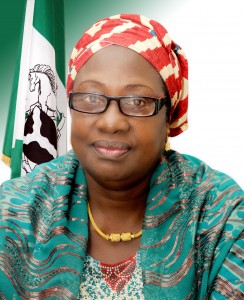
I sympathise with the new Minister for Environment, Lawrencia Labara Mallam, in terms of the enormous and challenging situation her coming to office will face based on the challenges of the environment sector. First is the problem of a short term of service (probably from now till May 2015) and second is the peculiar political intensity of the country culminating to Confab and national elections. In my own opinion, these distractions are sufficient reasons for the new Minister not to be sharply focused on the task ahead, not minding the concern of the relevant experience of the new Minister which is also very key to her success.
However, I remain poised and resolute to making the following comments and suggestions that I consider can be used to assess her performance at the end of tenure. The Minister needs to immediately conduct a gap analysis/assessment on what Ministry (as the custodian of sustainable development concept) has to do to make the Ministry the environmental gateway for Africa.
She has to re-position the country’s environmental mapping and do a quick “forensic analysis” on how to mainstream environment issues with others sectors of the economy like health, food security, agriculture, science and technology, lands development, petroleum resources, trade and investment, tourism, water resources, mines and works if Nigeria’s growth in the League of Nations must be sustained.
The Environment Ministry can no longer be handled as a stand-alone ministry the way it is now. Effort must be galvanised to understanding and actualising the nexus otherwise it is another business as usual. If possible put in place an advisory “national environment think-tank group” to advice on synergy.
Towards achieving this, the most germane task for the Minister is to immediately undertake the review of all environmental laws in the country before 2015. These laws are long overdue and no longer stand the test of today’s tenet, time and spirit. The environment sector has suffered most from regular change of its minister since its creation in 1999. She should not embark on an ambiguous responsibility of addressing lingering air, water, soil pollution issues or food poisoning or climate change jamboree. She should attempt instead to addressing key gaps for these sectors to thrive in 2015.
Above all is federal government’s will in funding environment issues, in the past years the ministry has been so very poorly funded. The Minister must look inward for increased appropriation funds from federal government and private sector, away from the dependence on foreign donors to addressing environmental issues. Environmental issues are right-based as enshrine in the fundamental human rights of citizens and as such cannot be funded almost entirely from donor funds as it is today. Only increased pre-judicial funding of environmental issues will help to achieve Dr Goodluck’s expectation of “human and environmental security” advocated in his recent Nigeria Centenary keynote address.
The ability to develop more sustainably depends on the capacity of Nigerian citizens and institutions to understand the complex environment and development issues so that they can make the right development choices. Citizens need to have the expertise to understand the potential and the limits of the environment. There is also the need to increase the sensitivity of the Nigerian populace to, and involvement in finding solutions for environmental and ethical awareness, values and attitudes, skills and behaviour needed for sustainable development. The new Minister at this daunting time therefore, has to give the Nigerian environment a human face.
By Leslie Adogame, Executive Director, Sustainable Research and Action for Environmental Development (SRADev Nigeria)
